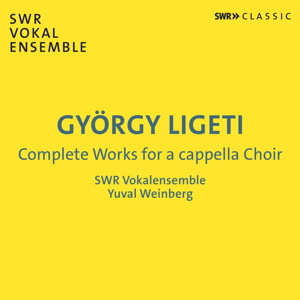
György Ligeti (1923-2006)
Complete Works for a Cappella Choir
SWR Vokalensemble/Yuval Weinberg
rec. 2019-2022, SWR Funkstudio, Stuttgart, Germany
SWR Classic SWR19128CD [55 + 60]
This May will mark the centenary of György Ligeti, one of the most original, controversial and remarkable figures in 20th-century classical music. Here is what I believe is the first chance to discover the choral works from almost all of his career. Many of them are virtuosic and need top choirs to lift the music off the page. We are fortunate that an eminent choir presents a fine recording of these pieces – sung in a language probably not familiar to them.
Disc 1 presents pieces from the 1940s and 1950s seemingly at random. One might prefer to listen chronologically. Much of it is influenced by folk music in settings of folk or folk-inspired poetry. There also are simple homophonic sacred choral works. We hear pentatonic melodic lines, modality and delightful dance-type rhythm, often in the more traditional texts (as, for example, in one of the pieces on tracks 5-8: “In the woods/in the rosemary woods / I lost my ox, / I did, for love”). That was the period when the national radio and concert promoters urged composers to arrange folk songs, to follow Bartók’s collecting of folk song – and when the dictates of socialist realism caused all music considered “formalistic” to be banned.
In the settings of Sándor Weöres, one of the composer’s favoured poets, we begin to recognise the later Ligeti: tonal clusters, unpitched noises and a wide vocal range. The settings of Night-Morning on tracks 10-11 are particularly striking.
All pieces are beautifully arranged for voices, sometimes in six parts sometimes in only two or three. Most are a capella, but the delightful Four Wedding Songs are for female voices and piano duet.
On disc 2, we meet the more experimental Ligeti, who had by 1958 met Stockhausen. He lived in Germany after he left his country following the 1956 uprising crushed by the Soviet Union. But first we have more arrangements and settings from the early 1940s and 1950s. They include the fascinating Burial at Sea, a rare setting of a text not in Hungarian. This poem by Endre Ady is set in Brittany. There are more settings of non-folk poetry, creating something that approaches a madrigal. They may be polyphonic or contain more adventurous harmonies. One such is Great Times, the poet Sándor Petofi’s cry for religious liberty.
The last three works come from Ligeti’s mature period. We get a glimpse in the early Two Canons (tracks 14-15); the second canon includes ecstatic parlando before the canonic voices enter, the sort of thing Ligeti was to do later in works like Aventures. The Etudes (tracks 17-19) include cluster chords, close canons, complex polyphonic rhythms and polytonality. The well-known Lux aeterna can be related to Ligeti’s Lontano and Melodien, which often evolve around a single pitch centre or cluster. This work was composed for the Stuttgart Schola Cantorum. The Three Fantasies based on Hölderlin were written for the Stockholm Radio Choir. Both choirs were at the very the top of their game. The highly complex, dissonant textures create intensity and drama.
There are no duds here. Each piece is brilliantly arranged and set for voices. I love this choir, and conductor Yuval Weinberg brings out the best in them. They are expressive, with immaculate tuning and decidedly clear diction helped by a superb acoustic and recording. All original texts are well translated into English (except that, rather oddly, there is no translation of the Hölderlin settings).
Gary Higginson
Previous review: John France (May 2023)
Help us financially by purchasing from


Contents
CD 1
1. Hey, Youth! (1952)
2. Mrs. Papai (1953)
3-4. Couple Dances from Kálló
5-8. Songs from Mátraszentimre (1955)
9. Solitude (1946)
10-11. Night-Morning (1955)
12. Easter (1946)
13. The Three Kings (1945-1946)
14. Choir Song after Goethe (1941)
15. Choral (1942)
16. The Seamstress (1942)
17-20. In a Strange Land (1945-1946)
21 The Fugitive (1946)
22. On the side of a High Cliff (1946)
23-26. Four Wedding Songs (1950)
27. Wedding Song (1950)
28-30. Songs from Inaktelke (1953)
CD2
1. Hortobágy (1952)
2. Burial at Sea (1943)
3-5. Dawn (1949-1950)
6. Buryat Harvest Song [1945)
7. Great Times (1946-1948)
8. Dawn in Breaking (1945)
9. Winter (1950)
10-11. Two Choirs on Poems by Balint Balassa (1946)
12. Orbán (1942)
13. The Woman and the Soldier (2.55)
14-15. Two Canons (1947/1952)
16. Lux aeterna (1966)
17-19. Hungarian Etudes after poems by Sándor Weöres (1983)
20-22. Three Fantasies based on Friedrich Hölderlin (1982)


















